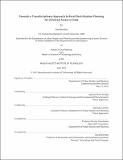Towards a transdisciplinary approach to rural electrification planning for universal access in India
Author(s)
Borofsky, Yael
DownloadFull printable version (5.943Mb)
Other Contributors
Massachusetts Institute of Technology. Technology and Policy Program.
Advisor
Ignacio Pérez-Arriaga and Gabriella Carolini.x
Terms of use
Metadata
Show full item recordAbstract
Around 30% of India's roughly 1.2 billion people lack access to electricity, largely in rural areas. National and state rural electrification efforts are predominantly focused on grid extension, but interest in off-grid systems, like solar home systems and microgrids, for rural areas has been growing. Little policy or regulation dictates off-grid electrification and detailed data about customers' needs are hard to access, making it difficult for planners to determine the best electrification mode for a given area. New planning approaches are needed in the face of these challenges. Technoeconomic planning methods typically dominate rural electrification planning, yet many obstacles face rural electrification planners that are not technoeconomic. This thesis posits that combining the best aspects of technocratic and communicative planning into a transdisciplinary planning methodology will allow planners in India to incorporate technoeconomic, socioeconomic, sociotechnical, social, political, and regulatory factors that influence rural electrification into a single comprehensive approach to regional rural electrification planning in India. I propose and demonstrate three elements of this overarching methodology. First, I attempt to elicit planners' perspectives on rural electrification planning priorities in India through semi-structured interviews (n = 6) and a pilot survey (n = 10). Second, I discuss the importance of understanding consumer electricity needs and demonstrate how electricity demand is both a technoeconomic and non-technoeconomic factor that influences rural electrification. Third, I show how a technoeconomic electrification planning model, called the Reference Electrification Model (REM), can illuminate the consequences of different assumptions about electricity demand on technology decisions for Vaishali District in the state of Bihar. This research emphasizes the variety of perspectives and dynamics that influence rural electrification planning and reflects on the challenges of developing a truly transdisciplinary rural electrification planning methodology for India.
Description
Thesis: M.C.P., Massachusetts Institute of Technology, Department of Urban Studies and Planning, 2015. Thesis: S.M. in Technology and Policy, Massachusetts Institute of Technology, Engineering Systems Division, Technology and Policy Program, 2015. Cataloged from PDF version of thesis. Includes bibliographical references (pages 122-126).
Date issued
2015Department
Massachusetts Institute of Technology. Department of Urban Studies and Planning; Massachusetts Institute of Technology. Engineering Systems Division; Technology and Policy ProgramPublisher
Massachusetts Institute of Technology
Keywords
Urban Studies and Planning., Engineering Systems Division., Technology and Policy Program.